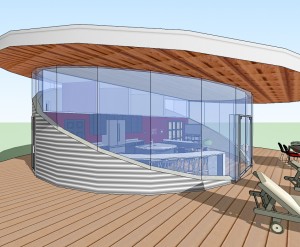
“Liberal arts students are able to research and synthesize information really well and create something both aesthetically pleasing as well as efficient and environmentally friendly,” said Ben Mothershead ’16, one of the group’s interim leaders.
Most recently, the team sent a delegation consisting of Mothershead, Phoebe Pinder ’16, Patrick Kinley ’16 and Colin Dowdell ’17 to California this past weekend to attend the national competition. The delegates were able to observe and learn from competing schools’ completed designs. According to Dowdell, some teams had patents on the insulating technologies they developed and a few of the houses were controlled by mobile apps.
However, rather than creating a futuristic, high-tech home, the focus of Team Grinnell is to create an inviting and welcoming environment. Grinnell’s current design emphasizes the holistic creation of a sustainable house, rather than one that meets consumptive standards. While likely to be modified, the design involves incorporating recycled grain into building a self-sustaining and environmentally friendly silo house. According to Mothershead, the team is also looking into keeping it true to Iowa through integrating corn-based insulation technology.
Currently in its start-up phase, the group is mainly focused on letting more students know about the project and bringing in students with diverse interests and skills. Due to the current government shut-down, the Department of Energy has yet to release the final request for proposals. But once submitted, the team will hear by early 2014 whether or not they will be competing next year.
If approved to compete in the Solar Decathlon competition, the group would receive $100,000 towards the planning, design and construction of their house from the Department of Education, funds they plan to supplement with corporate and private donations from members of the extended College community. In addition, in September the group asked for $150,000 from the College’s Innovation Fund, and hopes to be given access to College non-monetary resources, such as land on which to build the house, group office space and construction tools, as well.
Dowdell rationalized the value of the project by pointing out an existing building on campus, the Center for Religion, Spirituality, and Social Justice (CRSSJ).
“That building shows that we embrace the freedom of spirituality and religion. By having it on campus, it is a part of what [the College] represents,” Dowdell explained. “A solar-powered house would represent the College’s awareness of sustainability.”
In an effort to increase attention to sustainability, the Solar Decathlon group recently submitted a proposal to Grinnell’s Innovation Fund to create more sustainability-related coursework at Grinnell.
“Grinnell has this philosophy of experiential education, and this would be the ultimate embodiment of that — having students do research on sustainability practices and then applying it to something entirely tangible and built with their own hands,” Mothershead explained.
Mothershead believes that the project would not only elevate Grinnell as an institution, but also garner a greater interest from prospective students when they notice Grinnell’s level of commitment to social justice in the form of sustainability. But, on a greater scale, Mothershead believes that our society needs to embrace sustainability to combat the growing consequences of carbon emissions and climate change.
“As a society, we are incredibly consumptive and creating sustainable houses would not only reduce carbon emissions, but also make people aware of how they live,” Mothershead said. “You can still have an incredible quality of life without living like a carbon king.”
Anyone interested can contact Solar Decathlon at [solardec].

































































